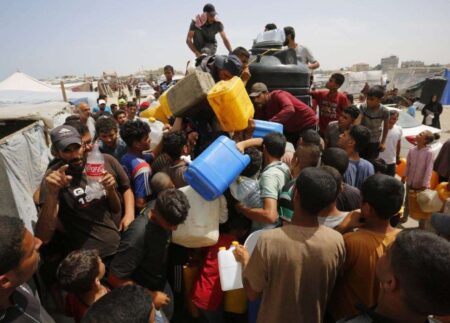Euro-Med Human Rights Monitor: Palestinian Territory – Through persistent, systematic, and widespread targeting of the Gaza Strip’s water sources and desalination plants, Israel is using water as a weapon against Palestinian civilians. In addition to imposing famine, Israel is deliberately reducing the amount of water available to residents of the Strip—especially potable water sources—intentionally targeting the over 2.3 million people who live there as part of its genocide, ongoing since last October.
On Monday, July 1, the Euro-Med Monitor field team observed significant damage to a desalination plant in the Al-Zaytoun neighborhood, south of Gaza City, as a result of direct Israeli targeting. This also resulted in the killing of a young man who was filling a gallon with water, plus the wounding of other individuals. The station, which provided services to at least 50,000 people in several nearby residential neighborhoods, sustained significant damage after being bombed by the Israeli army with a GBU missile that broke through multiple stories and detonated on the ground floor.
As summer temperatures rise, the people of the Gaza Strip are facing significant challenges in accessing water. Estimates show that since October of last year, the per capita share of water in the Gaza Strip has decreased by 97% due to the extensive destruction of water infrastructure by Israel. Therefore, as a result of the genocide, the per capita share of water in the Strip has decreased to between 3 and 15 litres per day, while in 2022 it was approximately 84.6 litres per day.
In view of the ongoing crimes against the Palestinian people that deprive them of necessities for survival—such as the destruction of over 700 wells and water desalination plants since the start of the genocide—all areas of the Gaza Strip are experiencing a shortage of water, and the sewage system is collapsing. Meanwhile, certain areas of the Strip are suffering from a shortage of fuel, which Israel forbids from entering the Strip, despite the large number of casualties—including children—caused by infectious diseases and epidemics that spread through the accumulation of contaminated water due to inoperative sewage stations.
Continued destruction and devastation by the Israeli army is rendering the Gaza Strip unlivable, particularly after the army’s destruction of 9 out of 10 water tanks and half of the water networks, or 350 km out of 700 km.
Additionally, as a result of the crimes and arbitrary policies of Israel, all six wastewater treatment plants have been disrupted, approximately 65 sewage pumps stopped, and 70 km of sewage networks destroyed. This has resulted in the unchecked disposal of wastewater, estimated to be around 130 thousand cubic meters per day, onto Gaza Strip roads and shelters for displaced people.
According to United Nations estimates, about 96 percent of the Strip’s population (2.15 million people) faces high levels of acute food insecurity. While the whole territory is classified in Emergency (IPC Phase 4), over 495,000 people (22 per cent of the population) are still facing catastrophic levels of acute food insecurity (IPC Phase 5). In this Phase, households experience an extreme lack of food, starvation, and exhaustion of coping capacities.
Euro-Med Monitor warned last January that distress is engulfing Gaza City and the Strip’s northern regions in alarming ways—a result of Israel’s cutting off of the water supply in the Strip, systematic and intentional Israeli bombing of water sources and wells, and a lack of fuel required to run water conversion and distribution facilities.
The lack of drinking water in the Gaza Strip has become a matter of life and death, with residents currently being forced to drink unclean well water amid continued Israeli military attacks and lack of food, water, and fuel supplies.
The excessive consumption of undrinkable saltwater leads to high blood pressure; kidney disease; increased risk of stroke, intestinal, and stomach diseases; constant vomiting; and diarrhea. These effects will ultimately result in excessive dehydration of the body’s tissues, particularly brain tissue.
Euro-Med Monitor conducted an analytical study last December month that included a sample of 1,200 people in the Gaza Strip in order to ascertain the impact of the humanitarian crisis experienced by residents of the enclave in the midst of Israel’s genocidal war.
According to the study, the rate of access to water in the Strip, including drinking, bathing, and cleaning water, is just 1.5 litres per person per day. This is 15 liters less than the minimum amount of water required for survival at the level required by international standards.
International humanitarian law forbids attacks, destruction, or disruption of vital facilities necessary to the survival of the civilian population, such as drinking water facilities and networks. International humanitarian law also strictly prohibits the use of starvation as a weapon; as an occupying power, Israel is obligated under international humanitarian law to provide basic needs and protection to the Palestinian people of the Gaza Strip.
The Rome Statute of the International Criminal Court provides that intentionally starving civilians by “depriving them of objects indispensable to their survival, including willfully impeding relief supplies” is a war crime.
Israel has been committing acts of genocide against the civilian population of the Gaza Strip since 7 October 2023 according to the Rome Statute of the International Criminal Court, the Convention on the Prevention and Punishment of the Crime of Genocide, and pertinent international judicial rulings. Israel’s egregious crimes include depriving the civilian population in the Strip of enough potable water, which has caused serious, intentional harm and trapped them in living conditions meant to destroy them.

